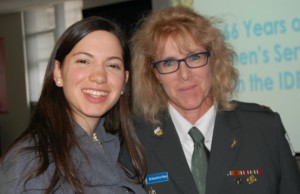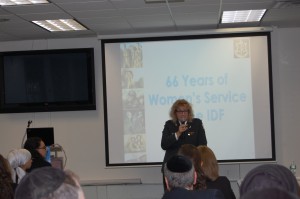
Rachel Tevet-Vizel’s grandmother was a strong woman, a woman of vision, faith, and conviction. Raised in a Hassidic family in Poland, Bluma left for Germany when she married. But when her husband was beaten by a band of young Nazis in 1935, Bluma decided her family must leave for Palestine. It was the only option in her mind; the place to which they prayed to return to every day.
Together, Bluma and her husband helped establish the community of Kiryat Ono, today a large Israeli city on the outskirts of Tel Aviv. They opened their home as a synagogue when no other options existed for communal prayer gatherings. And as her two daughters came of age, she advised them, “If we are to live here, you must go into the army. We have to protect [the land] ourselves. You cannot simply rely on others to do it for us because we are religious. This is our country and this is our time to protect it.”
“This decision was very unacceptable [in its day] because they were religious girls, but they served,” Tevet-Vizel stressed to a crowded room of female employees at Orthodox Union headquarters. “And, they remained committed to their traditions.” Now a brigadier general in the Israel Defense Force, she served as inaugural speaker to the OU Women’s Affinity Group, coordinated by Penny Pazornick, North American associate director of OU Israel Free Spirit-Taglit Birthright Israel.
General Tevet-Vizel said her family history inspired her to volunteer for army service after graduating from a religious girls high school in 1981.
Israel is one of few countries around the world with a mandatory draft. At the age of 18 all males are required to serve, an issue heavily politicized. Religious women are allowed exemption with written proof from rabbinic authority of their religious status, or given the choice to volunteer for non-military national service.
General Tevet-Vizel began as a soldier/teacher in a development town elementary school and with officer training advanced to become commander of the officer training base. She earned a law degree from Tel-Aviv University, and ultimately returned to IDF service as a military lawyer. In time, she became a military court judge, serving as president of the IDF high military court.
Today General Tevet-Vizel is the highest ranking female officer in the IDF, positioned fourth below the Chief of General Staff. Since 2011 she has served as Advisor to the Chief of General Staff on Women’s Issues.
She lives in a small religious community with her husband and three children, and can often be found giving classes on Shabbat discussing Jewish law, and the weekly Torah portion. Next year, her eldest daughter will began serving in military intelligence.
Today, there are more women in higher ranks of the IDF than ever before, with 92 percent of military positions available to them. Groundbreaking women currently serve as field intelligence battalion commanders, major artillery commanders and naval intelligence commanders. Women represent 33 percent of active soldiers. They comprise 3.3 percent of combat manpower (border police, anti-aircraft, search and rescue, K-9 unit, pilots, naval officers, artillery or light infant battalion); 39 percent of intelligence manpower units; 51 percent of cyber electronic technology units and 15 percent of reserve personnel. They serve in education and personnel, and as field doctors and paramedics.

General Tevet-Vizel gave an overview of women’s contributions to the IDF and how the organization has adapted over the years to be more accessible, respectful and beneficial for female participation. “We don’t just say ‘come to the army and you will deal, somehow,’” she quipped. “The IDF understands that certain conditions must be arranged for religious women to manage, and thrive.”
Religious females are issued skirts as part of official uniform gear. Each base or place of service has a synagogue with separations for men and women, and special times are allotted for female prayer. Religious female soldiers are mandated to participate in days of learning, offered at least once a month with learned rabbis. Units exist that are female-only, such as in military intelligence.
A recent survey conducted by the IDF inquired into the Jewish observance of female soldiers five years after they served. Women generally serve in the IDF for two full years, beginning at age 18 and leaving the army at age 20. The survey indicated that 85-percent of the women remained observant or became more observant following military service.
Concerning women who choose to make the IDF their career, General Tevet-Vizel noted, men and women are paid equally. Women are granted six-month maternity leaves. Permission to leave the service early is granted to those with children. Special programming is organized to empower women who combine career and family.
“Very often, I see how female soldiers go on to impact Israeli society. If they serve in a technology-related unit of the IDF, I will see them in high-tech companies around the country,” General Tevet-Vizel observed.
Not every position is female-appropriate, she said. While the IDF will adjust a rigorous physical training program to adapt male versus female abilities, there are times real life situations cannot be changed. General Tevet-Vizel gave the example of a wall that must be jumped as part of an officer training course, the average height and width of a wall found in Gaza, or Lebanon. “During an operation, you won’t have a step ladder to help you cross the wall,” she explained. “Protecting the State of Israel is the main goal of the IDF, not providing equal opportunities for men and women, yet where there can be equal opportunity, the army’s vision is better met,” she stressed.
During Operation Pillar of Defense in 2012, General Tevet-Vizel received a call from a female paramedic, pained that despite her excellence in her field and rank as the top soldier in her unit, she was told that as a female she would not be dispatched into Gaza. General Tevet-Vizel turned to her fellow IDF commanders, stressing, “if this woman decided to become a paramedic, she understands the meaning of it, and that includes joining her unit into Gaza. If you really want women to serve in the IDF—not just acting as a poster statement—you must let them do what they can.”
More than ten female paramedics were stationed in Gaza and saved lives during Operation Protective Edge this summer, General Tevet-Vizel noted.
Operation Protective Edge found many female soldiers stationed on the Gaza border as artillery soldiers and observers, in addition to paramedics, and those service in intelligence and education units. An outpouring of donations were sent by Israeli civilians to support soldiers away from home with food, clothing, supplies. One day General Tevet-Vizel received a request for 10,000 kits of women’s underwear. While the boxes of donations were often filled with clothing for male soldiers, few thought of the females stationed away from home for weeks at a time.
With Chanukah approaching, General Tevet-Vizel offered a final thought. Tractate Shabbat 23a teaches us that women are obligated to light candles because they had a share in the miracle, referring to how Yehudit, the daughter of Yochanan the Kohen Gadol, fed the commanding officer cheese and wine until he fell into a deep sleep, allowing her to kill him; when Greek soldiers realized their leader was dead, they fled.
“When I think about women in Israel, I think about the miracle of our State,” she said. “Our women are part of our miracle of the Modern State of Israel and because we are part of the miracle, we must take part. For me, I’m part of the miracle, so this is my obligation.”
—
The Orthodox Union Women’s Affinity Group engages female employees in ongoing conversations with the goal of creating an inclusive, enjoyable work place for all employees at the OU. This group will host events and brainstorming sessions, where participants will have opportunities to learn from outside speakers as well as colleagues. This will be an honest dialogue to identify concerns based on individuals and the collective. Topics include women’s professional opportunities, salary equality, sensitivity to gender and family, promoting ambition, how to bring organizational change, and more.
The words of this author reflect his/her own opinions and do not necessarily represent the official position of the Orthodox Union.
